 |
 |
 |
History
of the Club - The Nineties
1989-99
When Howard Wilkinson signed Wimbledon hard man Vinnie Jones in the
summer of 1989, there were many doubts Vinnie Jones: 'Youngsters like David Batty, Gary Speed and Simon Grayson
were on the brink of breaking into the side. But there were others like
Ian Baird, Bobby Davison, Mark Aizlewood, John Sheridan and Brendan Ormsby
who didn't seem sure about where they stood and they'd formed a bit of
a clique. 'One day Strachan, who was as conscious as I was of the damaging atmosphere
that was increasing between the squad and the outsiders, said to me: "Look,
it's a case of us and them." He gave me the kind of look I took to mean
I should do something about it. I had become almost paranoid about eating
my food, hearing them whispering and sniggering, and one day I'd had enough.
I just leapt to my feet and confronted Davison. I smacked him in the mouth
and announced to the other twenty five or thirty lads in the room: "This
all stops, right here and now." 'I thought I'd done it again and was right in it with my new boss, for
whacking one of the players and confronting all the others. 'Howard Wilkinson is one of the coolest men I've ever met - so confident,
so sure of himself and with that uncanny ability to convince others they
should believe in him as well. In that blunt Yorkshire accent of his he
said: "Sit down, son … You've disappointed me a bit … I've just been down
to the players' lounge. Can't find one speck of blood in there." 'And then he told me the story of how Leeds came to pay £650,000 for
me … He told me how he had sat in the stand at Highbury with Mick Hennigan
at one of the last games of the 1988/89 season. It was when Gouldy had
brought in an overseas player, Detzi Kruszynski … He was the kind of player
who only wanted to perform when he had the ball; he wasn't interested
in defending, picking up the runners. I was screaming at him to do his
job, to go with his runner but he let another one by and Arsenal almost
scored. I flew at Detzi full blast … There was a bit of a bust-up and
the referee had to separate us. Wilkinson … turned to Mick and said: "That's
the man we want." It was my leadership qualities he felt were vital to
sorting out the dressing-room and establishing the collective spirit that
would give Leeds their best chance of promotion.' Jones would go on to make himself a cult figure at Elland Road, a firm
favourite behind whose clenched fist approach they could rally; he was
Wilkinson's master stroke. Season ticket sales raised £820,000, but the start was a crashing disappointment
with a 5-2 defeat at Newcastle after being 2-1 ahead at the half hour.
However, it was a temporary aberration and the Whites surged off on a
long unbeaten run with the 2-0 victory at Middlesbrough on 9 December
taking them top. Wilkinson refused to take anything for granted and took steps to freshen
things up, selling Ian Baird and Noel Blake and using the money to sign
Nottingham Forest target man Lee Chapman, Sheffield Wednesday's Imre Varadi
and tough-tackling Chris Kamara from Stoke. Strachan top scored with sixteen League goals and earned himself a Scotland
recall, but it was Chapman's twelve goals in twenty-one games which proved
decisive, justifying Wilkinson's investment in a man he had managed at
Sheffield Wednesday, but who had been a dismal failure at Arsenal. Leeds were in a nip-and-tuck race with Sheffield United and Newcastle
with only two of the teams guaranteed promotion. A 4-0 hammering of their Sheffield rivals on Easter Monday seemed decisive,
but the advantage was thrown away carelessly. United drew at Brighton
and then lost their unbeaten home record to Barnsley. The outcome of the
promotion race was very much up in the air with Leeds needing to win both
their final games, at home to Leicester and away to Bournemouth. Mel Sterland gave United the lead against Leicester but they couldn't
add a second and when Foxes midfielder Gary McAllister equalised the fans
were in despair. The home side launched a frantic assault on the Leicester
goal but their hopes seemed to be over as the minutes flew by without
a second goal. At the death, however, Gordon Strachan proved his worth,
settling matters with a dramatic late winner which sent Elland Road into
raptures. Newcastle's defeat of West Ham that same afternoon left Leeds needing
victory at Bournemouth on Bank Holiday Monday to secure promotion and
the Second Division title. United were allocated 2,200 tickets for the vital game at the 10,000-capacity
Dean Court, but an estimated 5,500 fans flooded down to the South Coast,
promising a day of disorder. The tension never quite spilled over, thanks mainly to United securing
the victory they needed when Chapman headed home a Kamara cross to end
their exile from the top flight. It was a magnificent finale to a wonderful season, as recalled by Strachan:
'There was a oneness with the team and supporters ... you get that once
or twice in a career ... they're in there with you, making the pass, feeling
every tackle, feeling the hurt.' With a return to the top flight secured, Howard Wilkinson set about ensuring
United would stay there. His spending in the job soared to £6m as he signed
former goalkeeper John Lukic from Arsenal, along with Leicester midfielder
Gary McAllister and West Brom defender Chris Whyte. The key change was McAllister for Vinnie Jones, the cult hero off to
Sheffield United in a £650,000 deal early in the new season. Leeds took to top-flight football in 1990/91like ducks to water, and
goals from Fairclough, Speed and Varadi had them three-up by half time
on the opening day at Everton, prompting Toffees keeper Neville Southall
to show his disgust with a sit down protest at his post. The Blues fought
back to score twice after the break but could not force an equaliser. After a patchy spell, a ten-game unbeaten run through November and December
had United third by the end of the year. The Yorkshiremen reached the League Cup semi-finals where they lost out
to Manchester United and they were beaten by Everton in the area final
of the Zenith Data Systems Cup. The success brought a burgeoning fixture
list which stretched Wilkinson's resources but they finished the season
fourth. There was an astonishing tussle with mighty Liverpool at Elland Road
on 13 April; the Reds took a 4-0 lead into the break but were rocked when
Chapman and Shutt scored early in the second period. John Barnes made
it 5-2 but then Leeds laid siege to the Liverpool goal with Chapman adding
two more to leave Liverpool's lead hanging by a thread. The referee disallowed
a fourth goal for the striker and United simply could not get back on
terms in a spellbinding thriller. Chapman finished the campaign as the First Division's leading scorer
with twenty-one goals, enjoying ten more in other competitions. He was
a brave and dominating spearhead, sometimes foolishly so; in February,
when he attempted a header against Tottenham, he smashed his face into
the cinder track round the pitch as he tumbled to earth. Howard Wilkinson strengthened his ranks for 1991/92 with the signing
of England international left-back Tony Dorigo from Chelsea, Southampton
striker Rod Wallace, Nottingham Forest midfielder Steve Hodge and young
Sheffield Wednesday defenders David Wetherall and Jon Newsome. The investment fortified a title bid as Leeds and Manchester United broke
away at the top of the table; after ten games they were the only remaining
unbeaten teams. A televised 4-1 victory at Villa Park on 23 November confirmed that the
Leeds run was no flash in the pan. They doggedly stuck to Manchester United's
tails despite expectations that they would fall away. Manchester were generally recognised as the best side in the country
and Leeds' credentials were put sorely to the test by a triple header
of fixtures between the two sides at the turn of the year, all at Elland
Road with the two sides paired in both the FA Cup and the League Cup.
Leeds lost both Cup encounters but took a point from a 1-1 draw on 29
December, enough to keep their title hopes smouldering. On New Year's Day, QPR unexpectedly won 4-1 at Old Trafford and when
Leeds won 3-1 at West Ham they went a point clear. A Lee Chapman hat trick inspired United to another outstanding performance
for the TV cameras as they won 6-1 at Sheffield Wednesday on 12 January.
They refused to wallow in self-righteous indignation when the Owls' Gordon
Watson was guilty of one of the most disgraceful dives of all time, conning
the officials into awarding a penalty, and stormed away to a comprehensive
victory. Chapman suffered a broken wrist during the FA Cup defeat to Manchester
United and was ruled out until the end of February. Howard Wilkinson sought
cover by bringing Tony Agana in on loan from Notts County and gambling
on the controversial French international Eric Cantona. Agana's contribution was minimal but Cantona made some telling contributions
despite a tenuous start, looking out of his comfort zone when making his
debut as substitute in a 2-0 defeat at Oldham. Cantona got his first start in a 1-1 draw at Everton on 23 February and
it was shortly afterwards that his United career took off with a goal
in a 2-0 victory at Luton. Cantona: 'At that exact moment when the ball went into the net, thousands
of supporters behind the goal seemed to plunge towards the turf. In scoring
this goal at the Kop end I became seduced. I had met, it seemed, my new
family.' The Manchester men were two points clear now, both sides having played
30 games. A 3-1 win at Tottenham on 7 March saw Leeds regain top spot. A midweek
4-1 collapse at QPR could not stay their momentum and Chapman's hat trick
plus goals from Cantona and Wallace saw off Wimbledon. Manchester United were running into a fixture backlog as they headed
for a League Cup final against Nottingham Forest on 12 April and they
now had three games in hand. Leeds had the points in the bag but few would
bet against Alex Ferguson's team. When Leeds dropped points with successive draws against Arsenal and West
Ham and a 4-0 defeat at Manchester City, the die seemed cast: Leeds were
a point shy of their rivals and had just five games remaining to Manchester's
seven. Yet Leeds would not surrender and hammered Chelsea 3-0 on 11 April, the
highlight a startling individual effort from Cantona. Cantona: 'In three touches I deceived the defenders who were coming to
tackle me, without the ball touching the ground and then finally placed
the ball in the far corner of the net. About ten minutes remained and
throughout the whole of that time the fans stood up in the stands, singing
and chanting. It was a very moving and extraordinary experience.' In truth, Cantona's was only a cameo contribution to Leeds' title drive;
he was used chiefly as a substitute by Wilkinson, who remained unsure
of his ability to blend into the all-important team fabric. The Elland Road faithful, however, had no doubts. They had found a folk
hero and the chant of 'Ooh, aah, Cantona,' became a rallying cry as they
gathered their forces for a final push. Cantona brought a flair that had
been missing. Leeds had the best midfield combination in the country in Strachan, Batty,
McAllister and Speed, and a resolute back four, but they had often looked
pedestrian, predictable and plodding up front, relying almost exclusively
on Lee Chapman for their goals. Cantona's was an inspirational presence
that became their focus. 16 April saw Manchester United beat Southampton in one of their two games
in hand to move two points clear at the top. Two days later both teams drew, Manchester at Luton and Leeds in a goalless
affair at Liverpool. It was a gallant effort, but looked futile. Manchester
had 75 points and four games remaining while Leeds were on 73 but had
played a game more. But at that stage the pressure of chasing a first title for 25 years
got to Fergie's men. Their nerves consumed them as they lost 2-1 at home
to Nottingham Forest on Easter Monday, 20 April. Leeds, facing Coventry
at Elland Road later in the day, took advantage with a 2-0 victory. Manchester still had a game in hand but wasted it when they lost in midweek
to relegation-threatened West Ham and On Sunday, 26 April, the television cameras captured the drama as Leeds
took to the field early for an extraordinary Yorkshire derby, away to
Sheffield United. Alan Cork gave the Blades the lead, but fortune was shining on Leeds
and they snatched a fluky equaliser on the stroke of half time, a Sheffield
clearance cannoning first off Gary Speed and then against Rod Wallace
before finding the net. Blades keeper Mel Rees was injured in the incident and his movement was
hampered thereafter. He was unable to offer much resistance when a McAllister
free kick was met at the far post by a headlong dive from Jon Newsome
and Leeds were ahead. The bizarre happenings continued as the Blades equalised courtesy of
Lee Chapman's own goal and United were gifted an astonishing winner. Rees
came out to meet a Leeds attack, but centre-back Bryan Gayle, unaware
of the keeper's advance, nodded the ball back to him and then stood in
frozen horror as it looped over the stricken custodian and on into an
unguarded net. Leeds had won an extraordinary contest 3-2 and the onus was on Manchester
United to match the feat or the championship would be on its way to West
Yorkshire. Their nerves betrayed them again and they lost 2-0 at Liverpool
to confirm Wilkinson's triumph. A closing day victory against Norwich was an unnecessary luxury as Leeds
hoisted the championship trophy. Howard Wilkinson's preparations for 1992/93 and the newly established
FA Premiership included the payment of a club record £2m for Arsenal's
David Rocastle and £800,000 to Blackburn for former midfielder Scott Sellars. United's season started promisingly when they won the Charity Shield
at Wembley, defeating Liverpool 4-3 with a hat trick from Cantona, but
they were dismal in the League and their Champions League campaign imploded
at the first stage when they lost 3-0 in Stuttgart. But they hammered the Germans in the Elland Road return, winning 4-1,
as recalled by Rick Broadbent in Looking For Eric: 'The return leg was
an epic encounter to rival the magical nights of the Revie era … For Cantona
the footballer, who said sublime moments of sporting beauty could provide
glimpses of eternity, this was the game that will live forever. It was
billed as "Mission Impossible". 'It was a night on which Leeds' key players all came up trumps. Gary
McAllister was magnificent as he led the midfield, aided and abetted by
Gordon Strachan and Gary Speed, while Cantona and Lee Chapman were immense
up front. Strachan and Cantona created the opening goal for Speed, who
tore into the box and connected with a sweet left-footed volley. It provided
a glimmer of hope, but when Stuttgart scored on the breakaway, that appeared
to be that. Leeds needed five goals and a third of the game had already
gone. 'A McAllister penalty then gave Leeds a 2-1 half time lead and the second
half saw them lay siege to the Stuttgart goal. Chances came and went with
monotonous regularity, until Cantona bustled his way into the box and
scrambled a looping shot into the net with the help of a German foot.
Chapman soon headed a fourth with a near post header and the incredible
suddenly looked feasible. The Germans hung on, though, and collapsed in
a heap at the end. They had been demolished, yet they had still won. They
breathed a sigh of relief.' Leeds had a totally unexpected reprieve when UEFA ordered a play-off
after discovering that Stuttgart had fielded too many foreign players.
Leeds won the replay 2-1 in the Nou Camp in Spain and revelled in the
moment. But they lost both legs in the second round against Rangers and crashed
out of the League Cup at Watford. It was Cantona's final game for the
club. The Frenchman had been in a rich vein of form but was continually at
odds with Howard Wilkinson. There were rumours that Cantona was having an affair with Lee Chapman's
wife, and Wilkinson saw the Frenchman as a disruptive influence - Cantona
had become bigger than the club and Wilkinson was only too ready to parcel
him off to Manchester United in a deal that transformed the Old Trafford
club. United went the entire season without an away League win and had to contend
with relegation anxieties, but were reprieved by strong form at Elland
Road. Wilkinson signed prosaic Sheffield United striker Brian Deane for a club
record £2.7m, letting Lee Chapman go to Portsmouth and later sold David
Batty to Blackburn for £2.75m. United recovered from a poor start where
they won just four of the first fifteen points to do reasonably well and
by Christmas they were second to Manchester United, going on to finish
fifth. Howard Wilkinson returned to Sheffield Wednesday to sign England midfielder
Carlton Palmer for £2.6m and left-back Nigel Worthington; he also offered
opportunities to two South Africans, defender Lucas Radebe and striker
Phil Masinga. The signings failed to excite jaded United fans who were starting to
despair of Wilkinson's judgement of a player, doubly so when Gordon Strachan
was allowed to leave Elland Road to join Coventry when most people thought
he should have been found a position on United's coaching staff. It was a stop-start autumn though Leeds kept their place in the top ten.
Their struggle in front of goal persuaded Wilkinson to break the club
record again when he paid Eintracht Frankfurt £3.4m for the prolific Ghanaian
striker Tony Yeboah. Wilkinson allowed Yeboah to bed in slowly before blooding him as sub
in the FA Cup defeat at Manchester United. He scored United's goal with
an untidy, scuffed tap in from a couple of feet. The African exploded in the weeks to come, scoring twelve League goals
in sixteen starts as Leeds ended the season in sparkling form to finish
fifth and secure a place in the UEFA Cup. Yeboah's entry to 1995/96 won him a place in United folklore as the team
began imperiously. Yeboah scored twice as Leeds won 2-1 at West Ham on the opening day and
then hammered home the goal of the season to His hat trick at Wimbledon in a 4-2 victory, with his second every bit
as memorable as the Liverpool effort, took his scoring rate to twenty-three
in twenty-five starts and four appearances off the bench. European hopes were dashed when PSV won 5-3 at Elland Road and then 3-0
in the return as the sheen faded on United's season. That prompted Wilkinson
to venture into the transfer market as he paid £1m to Oldham for central
defender Richard Jobson and spent £4.5m (yet another record fee) on Parma's
Swedish international Tomas Brolin. The World Cup star's contract included a clause allowing him to leave
in the summer. Wilkinson: 'It implied a doubt in commitment both on his
part and on mine. Buying him when we did meant there was no time to get
him properly fit and into the rhythm of the Premiership. I played Brolin
too soon, instead of working hard with him for six or seven weeks as I
did with Tony Yeboah. Brolin wanted to be in and foolishly I went along
with it.' The Swede looked out of condition but showed some of his old magic when
he inspired a 3-1 win against title-chasing Manchester United but there
were heavy defeats at Liverpool, Forest and Villa and United's only chance
of success was in the cup competitions. They reached the League Cup final
and progressed to the sixth round of the FA Cup, where they faced Liverpool
at Elland Road. Inexplicably, Wilkinson opted for a containing game against the Reds
and played for the goalless draw that his men secured, saying, 'There
isn't anything in my contract to say we must look good on television.
I felt our best chance was to keep things tight and try to expose the
flaws we had spotted. It didn't work out.' United crashed 3-0 in the replay. The score was repeated against Villa in the League Cup final, with only
the splendid promise of Eddie Gray's eighteen-year-old nephew Andy to
offer some positive memories. The players simply failed to turn up and the spiritless display drove
United's followers to distraction. They booed a downcast Wilkinson off
the field, accusing him angrily of losing the plot. 'I was gutted. I couldn't believe the way some of our players performed,'
he said later. 'I almost wished that one of them would take a swing at
the referee or they would start fighting among themselves. Anything to
show they were actually interested. What should have been a marvellous
experience, win or lose, turned into a nightmare. I was emotionally disembowelled,
close to walking away from it all.' Club chairman Leslie Silver, who had held the position for fourteen years,
resigned from the Board in April, doing so, he said, on medical grounds. His departure heralded a transformation behind the scenes at Elland Road,
as ownership of the club became the subject of a long-running battle between
London-based media group Caspian and Conrad, a sports and leisure company. The club's shares were held for the main part by Silver, larger-than-life
managing director Bill Fotherby and Peter Gilman. The first two supported
Caspian but Gilman was steadfastly against them, and furious when it was
announced in July that Caspian had paid £35m to gain control of the club. Gilman claimed that the deal was in breach of an agreement that any sale
must be by unanimous consent and legal disputes hampered Wilkinson's use
of the £12m transfer fund promised by Caspian. He had already brought in Liverpool striker Ian Rush on a free transfer,
made Lee Bowyer the most expensive teenager in the game at £2.6m and presided
over the big money departures of Gary Speed and Gary McAllister, but now
the protracted court case brought a hold to proceedings. When the Caspian deal was approved at the end of July Wilkinson moved
quickly to sign Crystal Palace goalkeeper Nigel Martyn and Manchester
United wide man Lee Sharpe. Leeds started 1996/97 in reasonable fashion but on 7 September were torn
apart in their fifth game. Manchester United won 4-0 at Elland Road, ruthlessly
exposing the flaws in Wilkinson's selection. When the now-despised Eric
Cantona preened himself before the furious Gelderd End after topping things
off with the final goal it appeared that a weary-looking Howard Wilkinson
had reached the end of the road. Two days later he was dismissed, quickly replaced by George Graham, desperate
for a way back into the game after the end of an FA ban for taking bungs
while he was manager at Arsenal. The appointment of Graham on 10 September 1996 saw Caspian shares soar
to 30p after they were issued weeks earlier at Graham's preoccupation with defensive consolidation made for some grim
afternoons for United followers that season. Goalkeeper Nigel Martyn proved
his class and Lucas Radebe demonstrated he had perfected the art of limpet-like
man-marking, while Graham added Gunnar Halle and the Dutch Terminator,
Robert Molenaar to the mix. Tony Yeboah and a rotund Tomas Brolin were
consigned to the shadows as Graham turned to the less gifted Derek Lilley
and Pierre Laurent up front; United were team with no cutting edge. A fit again Yeboah might have been the answer to the problem but the
African blew any chance of a reprieve after furiously hurling his shirt
at the bench after Graham subbed him at Tottenham. During the summer of 1997, Graham signed Rangers left-back David Robertson
and returned from a trip to Portugal with midfielder Bruno Ribeiro and
the flamboyantly-named Jimmy Floyd Hasselbaink. The Dutch front man enjoyed a scoring debut when United drew on the opening
day with Arsenal and found a rich vein of form in a forward pairing with
Rod Wallace which suited both men admirably. Hasselbaink scored sixteen
times goals and Wallace nine in a decent League campaign that saw United
finish fifth to secure a UEFA Cup spot. Graham signed Chelsea's Danny Granville and a second Dutch striker, Clyde
Wijnhard, to replace Rangers-bound Rod Wallace as he made preparations
for the 1998/99 season. The manager wasn't around long enough to see whether his investments
would pay off, skulking away to fill the vacant manager's chair at Tottenham
as furious United fans branded him a Judas. After rumours that Gordon Strachan and Martin O'Neill would take up the
reins, chairman Peter Ridsdale instead opted for Graham's unproven assistant
David O'Leary after a spell as caretaker. A deal for the shrewd O'Neill
was almost done and dusted but Ridsdale could not get that one over the
line. Almost by chance O'Leary stumbled on the treasure trove that was United's
glittering seam of young talent. The conveyer belt of youngsters included
Jonathan Woodgate, Alan Smith, Lee Bowyer, Matthew Jones, Harry Kewell
and Stephen McPhail and United dispensed with the services of Rush, Deane,
Dorigo, Brolin, Yeboah, Sharpe and Palmer as they gambled on O'Leary's
'Babes'. Indeed, young Smith celebrated his debut with a goal within three
minutes of coming off the bench in a 3-1 victory at Liverpool. David Batty returned to his spiritual home to become O'Leary's first
signing, after a £4.4m switch from Newcastle in early December. The season ended with United firmly installed as everyone's second favourite
team, the refreshing vigour of youth propelling them to another European
qualification, secured on the strength of a 5-1 thrashing of West Ham.
An eleven-game unbeaten run came to an end four days later at Chelsea
but United ended on a high by defeating Arsenal.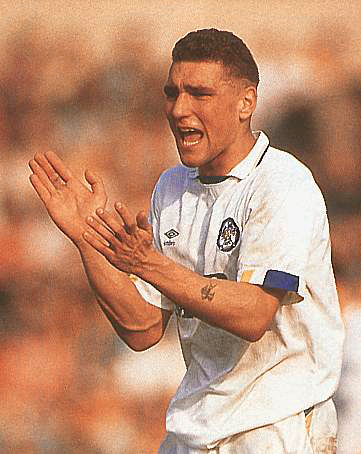 as to the wisdom of the move, but Jones became the cornerstone of Wilkinson's
plans to shake up the club, his enforcer on the field and off.
as to the wisdom of the move, but Jones became the cornerstone of Wilkinson's
plans to shake up the club, his enforcer on the field and off.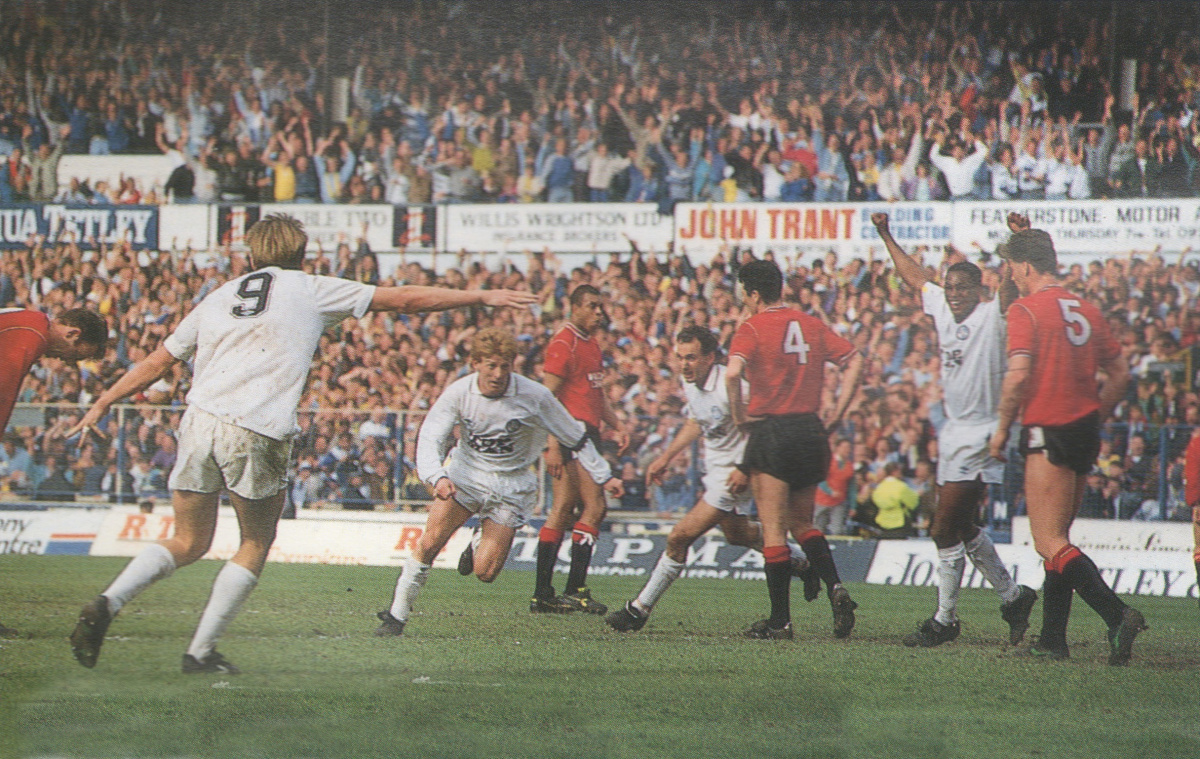
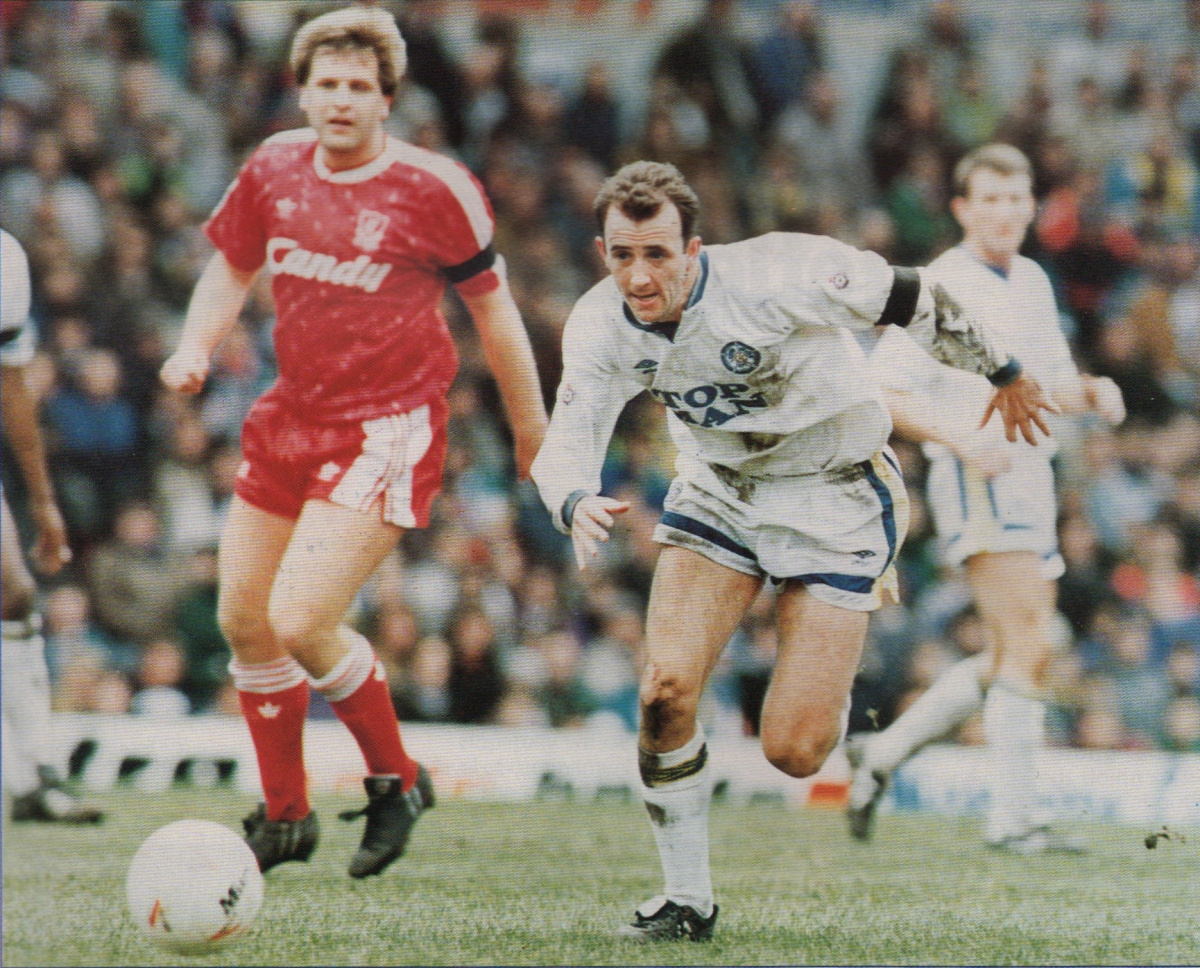
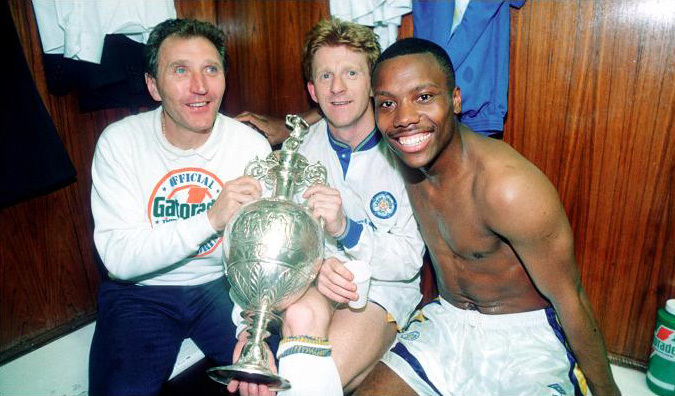 suddenly Leeds had their destiny in their own hands; victories at Sheffield
United and at home to Norwich would guarantee them the title.
suddenly Leeds had their destiny in their own hands; victories at Sheffield
United and at home to Norwich would guarantee them the title.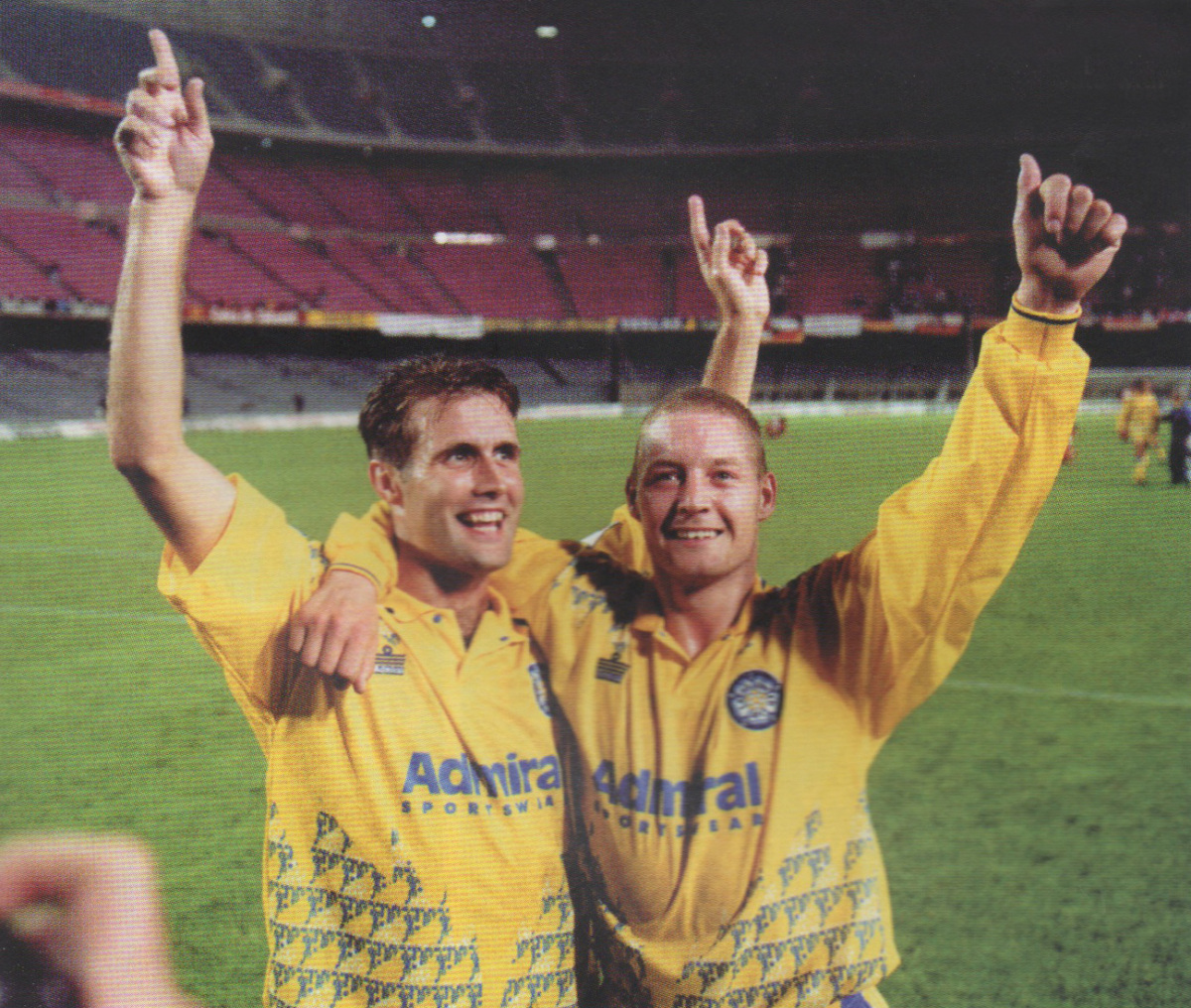
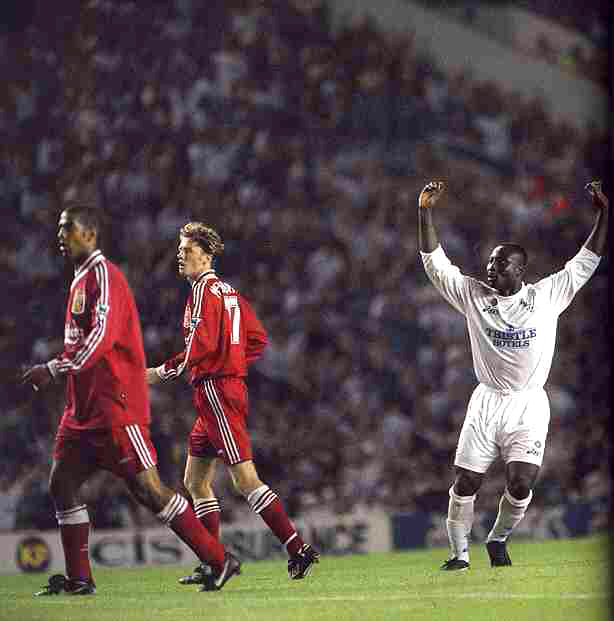 defeat
Liverpool at Elland Road. He added another in a 2-1 defeat at Spurs and
then scored all three in an astonishing 3-0 victory in Monaco as United
began their European challenge.
defeat
Liverpool at Elland Road. He added another in a 2-1 defeat at Spurs and
then scored all three in an astonishing 3-0 victory in Monaco as United
began their European challenge. 18.5p.
18.5p.